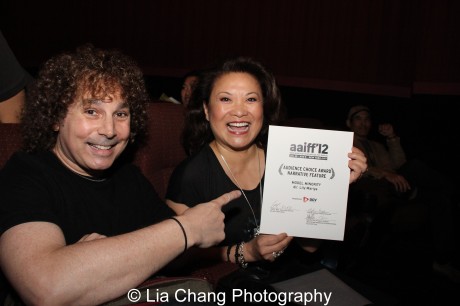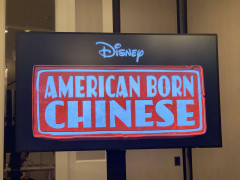Spotlight
American Born Chinese coming to Disney+ in 2023
Video: Academy Award Winner Chris Tashima Talks with Lia Chang About His Roles in Lily Mariye’s Model Minority and Lil Tokyo Reporter
By Lia Chang
Academy award winning director and actor Chris Tashima can currently be seen in three very different films.
He is in Jeffrey Gee Chin’s narrative short Lil Tokyo Reporter as Sei Fujii, an immigrant pioneer, leader and publisher.
In Lily Mariye’s impressive directorial debut feature Model Minority, Chris gives a rich multi-layered performance as the Sansei alcoholic father.
And in Eric Byler’s Americanese he plays the romantic lead opposite Joan Chen, which won a Special Jury Prize for Outstanding Ensemble Cast at the South by Southwest Film Festival.

He has appeared in several noted independent features including Rea Tajiri’s Strawberry Fields, starring Suzy Nakamura, and Sherwood X. Hu’s Lani Loa -The Passage (from executive producers Francis Ford Coppola and Wayne Wang), as well as Hu’s ensemble drama, On the Roof.
Tashima received an Academy Award® for the dramatic short film, Visas and Virtue, which he directed, co-wrote and starred as Holocaust rescuer Chiune Sugihara. For television, he directed, co-wrote and acted in the PBS Special, Day of Independence, receiving an EMMY® nomination. Visas and Virtue and Day of Independence is available on DVD and can be found here.
Directorial stage credits include world premiere’s of Dan Kwong’s Be Like Water at EWP, and Nihonmachi: The Place to Be, a musical tribute to the history of Japantowns, produced by the Grateful Crane Ensemble.
The Los Angeles based Tashima was in New York in August to promote Lily Mariye’s Model Minority at the Asian American International Film Festival.
The film stars Nichole Bloom as Kayla, an underprivileged Japanese American girl with a drug addict mom (Jessica Tuck) and an alcoholic dad (Tashima), who endangers her promising future as an artist when she becomes involved with a drug dealer (Delon De Metz). Laura Innes, Helen Slater, Takayo Fisher, Courtney Mun and Marc Anthony Samuel are also featured, along with music by three-time Grammy nominee, saxophonist Boney James.

Delon De Metz, Nichole Bloom, Lily Mariye and Chris Tashima at the 35th Asian American International Film Festival screening of Model Minority, at the Clearview Chelsea Cinemas in New York on August 4, 2012. Photo by Lia Chang
Model Minority has been resonating with film festival audiences across the country and racking up awards, including Special Jury Outstanding Director, Breakthrough Performance by a New Actor for Nichole Bloom, and Outstanding Cinematography at its World Premiere at the 2012 Los Angeles Asian Pacific Film Festival; the Best Nevada Film Golden Ace Award at the Las Vegas Film Festival; and the Audience Choice Award for Narrative Feature at the Asian American International Film Festival.
When Model Minority screens at the D.C. Asian Pacific American Film Festival on October 7, 2012, Mariye will be presented with the George C. Lin Emerging Filmmaker Award. You can also see the film at the Ojai Film Festival, October 25-28, 2012, the Vancouver Asian Festival, on Friday, November 2 at 7 pm at the Tinseltown Cineplex Odeon Theatres in Vancouver. http://www.modelminoritymovie.com/
Because Chris was so generous with his time, below are excerpts from the first in a series of my interview with him that I will post.
Chris: I was looking for an opportunity to come back to the Asian American International Film Festival which I’ve had two shorts play in. The first, I wasn’t able to attend way back in 1997 for Visas and Virtue and then I did come back in 2003 for Day of Independence. That played on Long Island, so I wasn’t able to come to Manhattan. So as soon as I had another film here, I was sure to come.
Lia: What is your history with Lily Mariye?
Chris: I first met her, she was doing (Velina Hasu Houston’s) Tea at a small theater in Los Angeles and I was pretty blown away by her performance. The whole ensemble was pretty great. A year later, she was cast in a show that I was designing, set designing for East West Players- Into the Woods. She’s a Quintuple threat. She started as a dancer in transition to acting – TV, film, now directing. I’ve know her for now over 20 years. Saw her short film The Shangri-la Cafe, which she did at AFI. Over the years, we’ve seen each other so much. She did a reading of a play that I directed. She played Yuri Kochiyama. I’ve always just loved her work and loved the idea that she was wanting to be a director, because we need more minority directors and more women directing.
She called me or emailed me about 4 or 5 years ago saying, ‘I’m working on my feature. I want to pick your brain about production issues.’ She mentioned that she had me in mind for the role of the father. I didn’t necessarily think I got another role.

A Model Minority team: Three-time Grammy nominee, saxophonist Boney James shows off his wife’s Audience Choice Award for Narrative Feature for Model Minority, at the 35th Asian American International Film Festival, at the Clearview Chelsea Cinemas in New York on August 5, 2012. Mariye, wrote, directed and shares producing credits with James, whose music is featured on the soundtrack. Photo by Lia Chang
I was happy to meet with her. I didn’t really have much to offer. She had all of her ducks in a row. She was really smart and knew what she was doing. The script was very dark, very bold. It was almost too edgy when I first read it. I didn’t critique the script. Later on, she sent me another version she’d been working on and it really improved quite a bit. I still didn’t necessarily think it was going to get produced. Then I heard through East West Players that she was casting the 2 young daughters, 2 Hapa teens, and it was going to be filming next month (the beginning of 2011). So I put something on Facebook about it. She emailed me apologetically and said, ‘I meant to tell you that I got my money and we’re shooting next month.’ She still wanted me to be the father. She was waiting to confirm because she wanted to firm up the whole cast.
Eric Byler’s Americanese lead to being cast in Model Minority
Chris: It was actually some clips that Eric Byler put up of Americanese. When that film was made, I was hoping it would open a lot more doors because it was the first lead role in a feature film. It was a great showcase for me. Of course, that requires that it gets released or people see it. Luckily, Eric put up clips and people have see those clips. There was a particular clip that Lily said clinched it for her.
Breaking down the character of the Sansei alcoholic father
Chris: To have it be a friend’s piece and a great role. It had so much depth and things that I could relate to in different ways. It was a great character in the story. It’s nice to be in the last shot of the film. It’s interesting because I’m not a father, I’m not an alcoholic. But I could relate to those things because of family or other people I’ve know especially the battle with alcoholism. Everybody has their demons that they fight.
A big part of the character is that he is Sansei. Dealing with a mother who was in camp - a Nisei. I’ve had a lot of discussions about what it means to be Sansei for our generation, that so many of us haven’t talked about it. I’m fortunate because I’ve done theater, done shows about camp, write movies, do research, talk to people. For artists, that has been explored. For the majority of Japanese Americans, it’s something that really was not talked about. Also for Nisei, they would not talk about it. My parents would talk about it. I think because they were a little bit younger, they didn’t harbor as much anger. I know for so many people, either their parents passed and they never got to ask those questions, or they did ask, and they refused to talk. The idea that Lily has a role that explores -how does that affect the next generation – those things just made it a rewarding experience.
Chris gives the 411 on Jeffrey Gee Chin’s Lil Tokyo Reporter
Jeffrey Gee Chin directed Lil Tokyo Reporter, with a screenplay written by Guinevere Turner (American Psycho), based on the research of executive producer Fumiko Carole Fujita and the Little Tokyo Historical Society. In addition to Tashima, Lil Tokyo Reporter stars Eijiro Ozaki, Ikuma Ando, Keiko Agena, and Sewell Whitney.
Chris: Lil Tokyo Reporter is a wonderful narrative short film that I’m really excited to be a part of. It’s right now in post-production. We filmed it over a week last year. Now it’s getting the score and visual effects.
It’s about a real life Issei pioneer named Sei Fujii. He was very active in the Japanese American community in the 20’s and 30’s, all the way up to the 50’s. I knew nothing of him, in fact, I had not heard of him until the filmmaker Jeffrey Gee Chin, came to me and said, ‘I’m making this film that I want you to be in.’ It’s amazing how many stories we don’t know about. But a person of this significance.
The reason he was discovered by the filmmaker, was because the Little Tokyo Historical Society did a story on the Japanese Hospital, which I believe was founded in 1929 for the local Japanese community to get medical needs fulfilled because of either language differences, cultural differences, dietary, all these needs that they weren’t getting from regular hospitals. Sei Fujii was part of the original founders of the Japanese Hospital. Pretty much everybody in Southern California has family that was there at some point.
It’s in East L.A. which had a large Japanese American community. Sei Fujii founded the Kashu Mainichi, which was the bilingual California Japanese Daily News, now no longer around, but it was a fairly large publication in California, as a means of bringing the community together, helping them, keeping them informed.
He also was the individual who sued the state of California in 1952, to overturn the Alien Land Law which prohibited the Issei, or Japanese immigrants who could not become citizens, from owning land. And he won. And that opened the door to eventually winning citizenship for Japanese immigrants. There’s all these things that he did in between. To learn all of this, and to learn that there was this one man who had done so much and that I had never heard of him, was again, a great need to tell the story.
Although Sei Fujii was one of the most pinnacle civil rights leaders in the early 20th century, Lil Tokyo Reporter highlights his journey away from his political contributions, and delves into his interpersonal journey to defend and promote his deteriorating community during the Great Depression.
Fujii vowed to protect his people, defending them in legal cases with Attorney Wright. During the Great Depression, the community united at their first annual pageant parade while Fujii promoted their accomplishments through his new radio program and newspaper.
Chris: So Jeffrey came to me. I had met him several times at different film festivals. He said, ‘Well I have this story that I wrote and I want you to be in it. I immediately said yes. I’ve been consulting with him a lot.
It’s his first large narrative work. It’s very ambitious. It’s going to be about half an hour. It’s a period piece, set in 1935 in Little Tokyo, so to recreate that era, to tell a very good dramatic story even though it has got all of this history in it, you still want to do a good story.
It’s basically about Fujii in the mid 30’s as a newspaper editor, confronting those challenges about, ‘Do you write about negative things about your own community. If you think in the long run it will help.
But if it makes your community look bad or makes individuals look bad. In fact, somebody tried to assassinate Sei Fujii. He was discovered lying in the street with a gun shot wound and was sent to a Japanese hospital. Of course, he didn’t die. But that’s how controversial he was. These kind of things happened back in the 30’s.
In the narrative that we’re telling, he discovers a gambling den in Little Tokyo and how it is sort of swindling the farmers that are coming to town to drink and gamble. Taking their money, a little bit of extortion, the dark, seedier side of Little Tokyo that people didn’t talk about. We met a lot of Nisei, that knew Issei, like their dads who used to go to this gambling joint. And none of them would talk about it. That’s what the film is about.
Jeffrey Gee Chin’s Lil Tokyo Reporter played to sold-out houses at its world premiere screening at Laemmle Playhouse 7 in Pasadena this weekend.
Click here to learn more about the film and here to donate to the fundraising campaign.
About The Little Tokyo Historical Society
The Little Tokyo Historical Society (LTHS) focuses on researching and discovering the historical resources, stories, and connections of sites, buildings, and events related to Little Tokyo as an ethnic heritage neighborhood. LTHS is committed to documenting and verifying history of locales, sites, and buildings, as well as preserving and sharing the history and personal stories of Little Tokyo and its residents.
LTHS was formed in 2006 by members of the Little Tokyo community to commemorate the Nikkei history and heritage through various means such as: archival collections, photos, exhibits, lectures and workshops, and gallery. Although other organizations documenting Japanese American history exist, LTHS narrows its focus by concentrating on the history of Little Tokyo in Los Angeles, rather than the larger scope of Japanese Americans nationwide.
LTHS operates as a volunteer organization, comprised of members from the Little Tokyo community including nonprofit employees, business owners, and residents.
Keeping JA History Newsworthy in ‘Lil Tokyo Reporter’
Click here for the Lia Chang Articles Archive and here for the Lia Chang Photography Website.
Lia Chang is an actor, a performance and fine art botanical photographer, and an award-winning multi-platform journalist.
- Tags: 1930, 1940, alcoholic, Alien Land Law, Americanese, Asian American Artists, Asian American International Film Festival, Asian American Issues, Asian American Pioneers, Backstage Pass with Lia Chang, bilingual California Japanese Daily News, Chiune Sugihara, Chris Tashima, Day of Independence, Eijiro Ozaki, Eric Byler, Film, Fumiko Carole Fujita, Guinevere Turner, Ikuma Ando, Japanese American History, Japanese Hospital, Japanese immigrants, Japanese Schindler, Jeffrey Gee Chin, Kashu Mainichi, Keiko Agena, Lia Chang, Lily Mariye, Little Tokyo Historical Society, model minority, New York, Nisei Week, non profit, Sansei, Sei Fujii, Sewell Whitney, Terasaki Foundation, the California Civil Liberties Public Education Program, Tokyo Reporter, Visas and Virtue, Visual Communications











